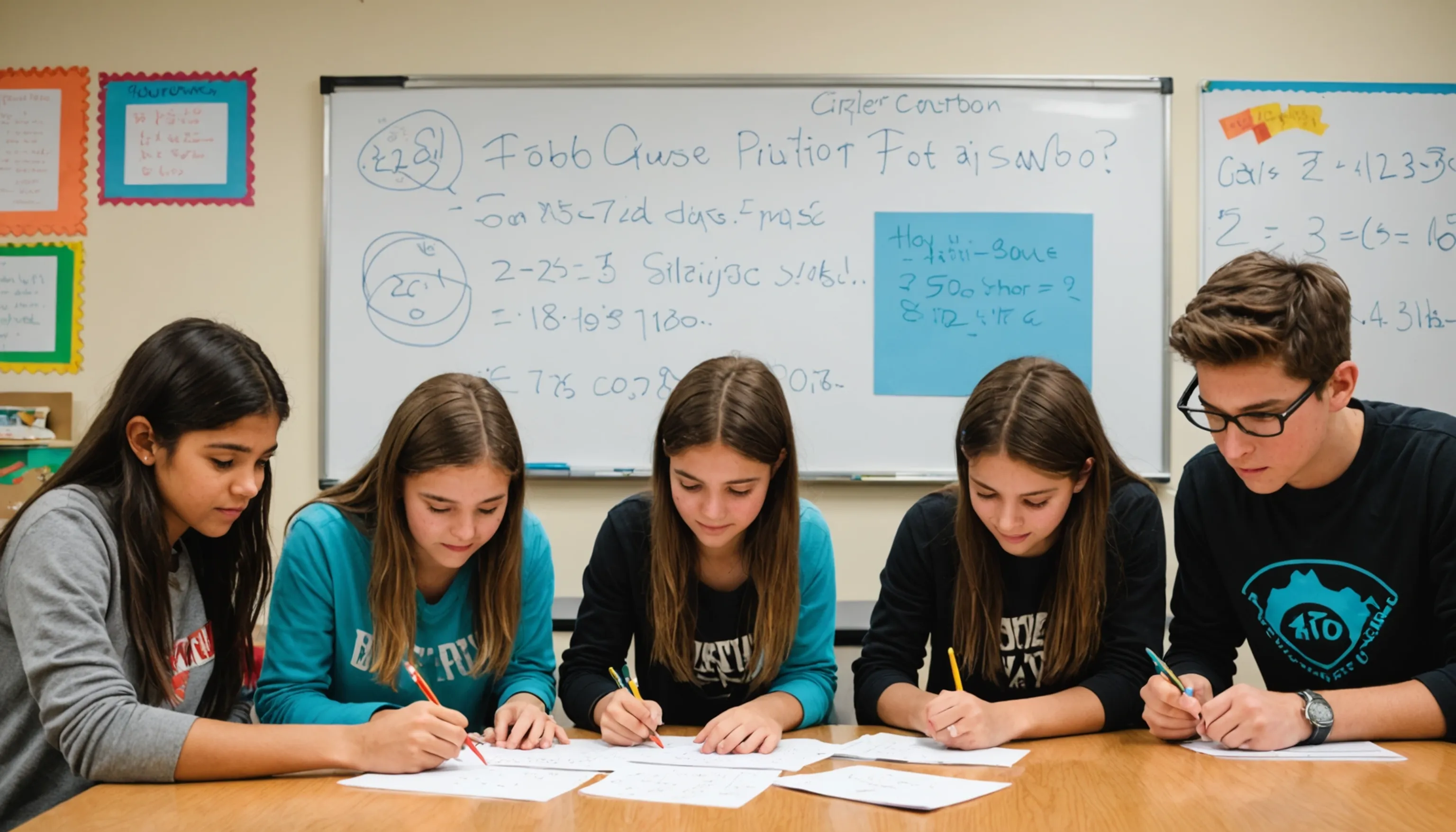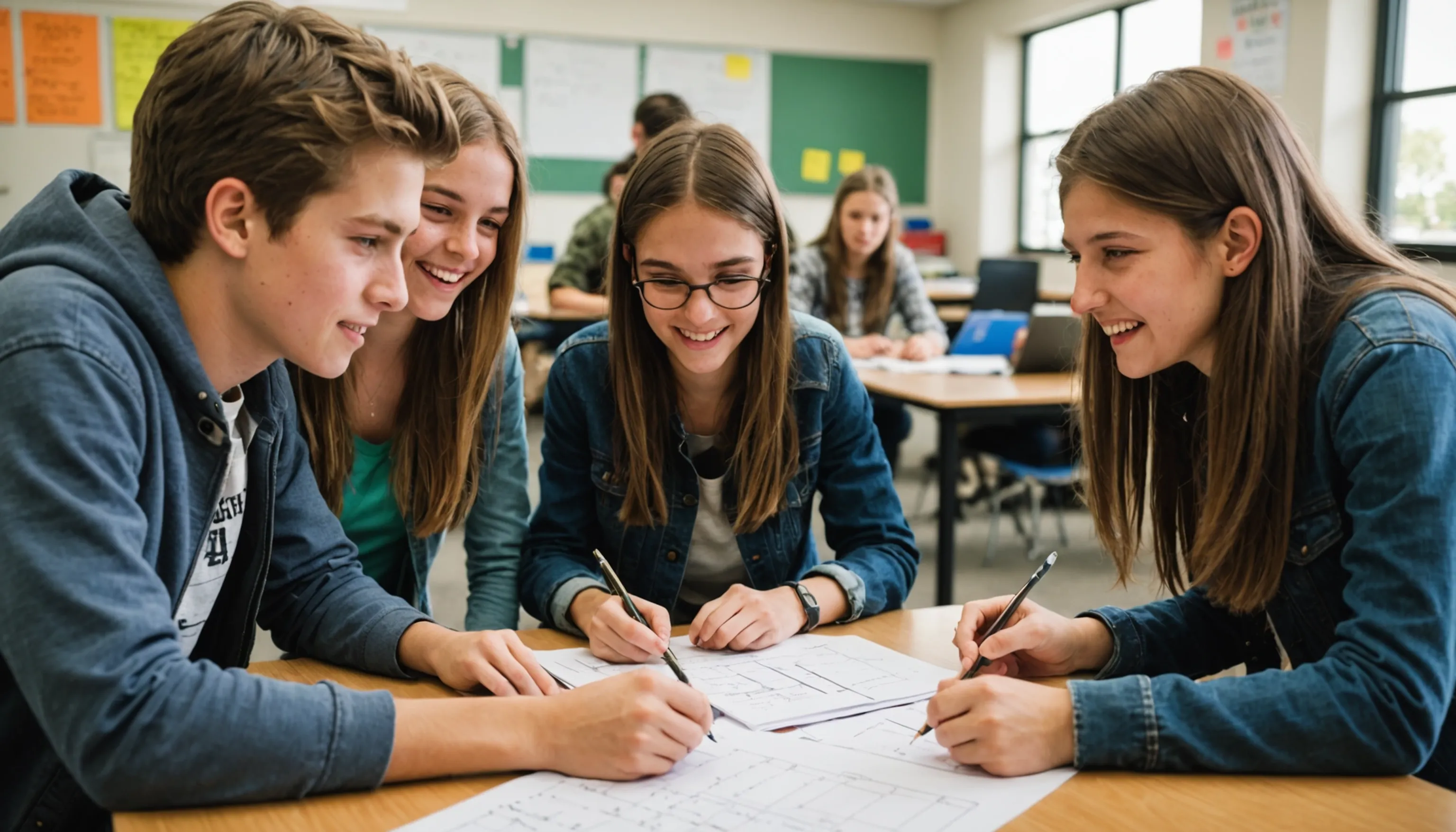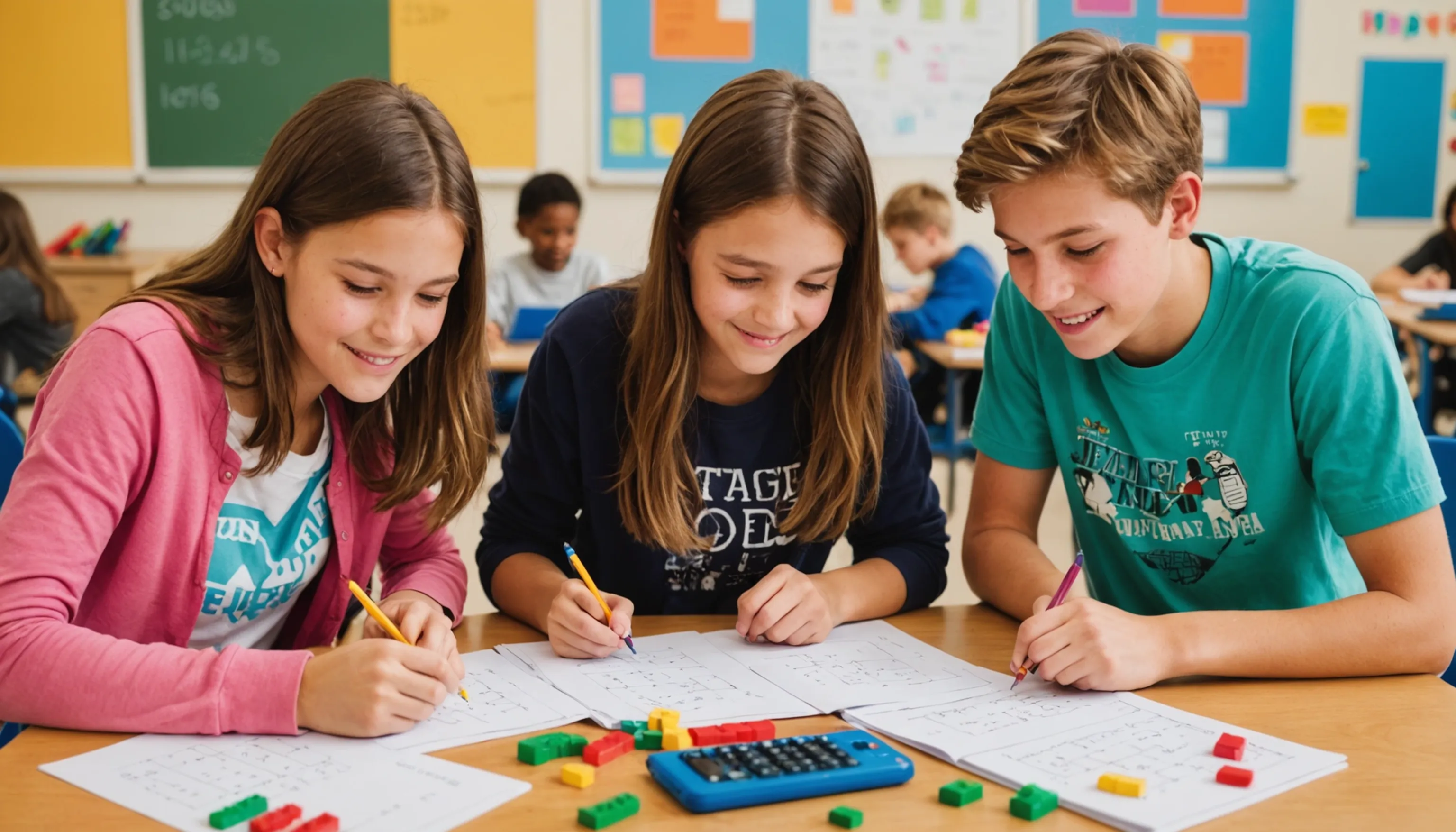Benefits of Afterschool Math Activities
 HvWHenry van Wagenberg
HvWHenry van Wagenberg
Benefits of Afterschool Math Activities for Teenagers
Afterschool math activities offer numerous benefits for teenagers, enhancing their overall learning experience. These programs provide an opportunity to deepen understanding of mathematical concepts in a fun and engaging environment. By participating in these activities, teens can improve their problem-solving skills, which are crucial for academic success.
Additionally, these sessions often promote collaborative learning, allowing students to work together and share different perspectives. This teamwork fosters a sense of community and encourages students to express their ideas confidently. Overall, afterschool math activities are essential in building a solid foundation in math for teenagers.
Enhancing Problem-Solving Skills
One of the primary benefits of afterschool math activities is their ability to significantly enhance problem-solving skills in teenagers. These programs are designed to challenge students with a variety of mathematical problems that require critical thinking and creativity. Rather than simply memorizing formulas, students engage in hands-on activities that encourage them to explore different strategies and solutions.
Through engaging exercises such as puzzles, group challenges, and real-world problem scenarios, teenagers learn to approach problems from multiple angles. This multifaceted approach to problem-solving is vital, as it helps students develop a robust toolkit of strategies they can apply in both academic and everyday situations.
Additionally, afterschool math activities often promote a growth mindset. When students encounter difficult problems, they learn that struggle is a part of the learning process. This mindset encourages resilience, teaching them that persistence is key to overcoming challenges. As they work through complex problems, they gain confidence in their abilities, which translates to improved performance in their regular math classes.
Moreover, these activities provide a safe space for students to experiment without the fear of making mistakes. This freedom fosters a love for math and an appreciation for the problem-solving process, ultimately preparing them for more advanced mathematical concepts in the future. By enhancing their problem-solving skills, afterschool math activities equip teenagers with essential life skills that go beyond academics.
Building Confidence in Math
Building confidence in math is a crucial outcome of participating in afterschool math activities. Many teenagers struggle with math due to a lack of understanding or previous negative experiences in the classroom. Afterschool programs provide a supportive environment where students can tackle math concepts at their own pace, helping to alleviate anxiety and build a positive attitude towards the subject.
In these settings, students often work on real-world problems and engage in collaborative activities that allow them to share their thought processes. This collaboration fosters a sense of community, where students feel comfortable asking questions and expressing their ideas. As they work through challenges together, they realize that they are not alone in their struggles, and this shared experience can significantly boost their confidence.
Moreover, receiving positive reinforcement from peers and instructors during afterschool activities plays a vital role in cultivating self-assurance. When students successfully solve problems or complete projects, they experience a sense of accomplishment that reinforces their belief in their abilities. This newfound confidence can spill over into their regular math classes, leading to greater participation and a willingness to tackle more complex problems.
As students gain confidence in their math skills, they become more open to learning and trying new strategies. They start to view math not as a daunting subject but as an exciting challenge. Ultimately, building confidence in math through afterschool activities sets the stage for academic success and a lifelong appreciation for the subject.

Encouraging Collaborative Learning
Encouraging collaborative learning is one of the standout benefits of afterschool math activities for teenagers. In these programs, students work together to solve mathematical problems, fostering teamwork and communication skills that are essential in both academic and professional settings. Collaborative learning not only enhances their understanding of math concepts but also allows them to learn from one another.
When teenagers engage in group activities, they bring diverse perspectives to the table. Each student may approach a problem differently, and sharing these methods can lead to a deeper comprehension of the material. For instance, one student might excel in visualizing problems, while another may prefer a more analytical approach. By discussing their strategies, they can develop a more rounded understanding of the concepts at hand.
Moreover, working collaboratively helps build a sense of community among students. It encourages them to support each other, celebrate successes, and navigate challenges together. This camaraderie can significantly reduce the anxiety often associated with math, as students feel less isolated in their learning journey. They learn to value input from their peers, which can enhance their critical thinking and problem-solving skills.
Additionally, collaborative learning prepares students for real-world scenarios where teamwork is often crucial. As they practice sharing ideas and working as a unit, they develop essential skills such as negotiation, conflict resolution, and leadership. Ultimately, encouraging collaborative learning in afterschool math activities not only enriches their math education but also equips them with skills for future success.
Improving Academic Performance
Afterschool math activities play a vital role in improving academic performance among teenagers. By providing additional practice and exposure to various mathematical concepts, these programs reinforce what students learn in school. As participants engage in hands-on activities and interactive lessons, they develop a deeper understanding of the material.
Moreover, the supportive environment of afterschool programs allows students to ask questions and seek help without the pressure of grades. This encouragement leads to improved confidence and better retention of knowledge, ultimately translating to higher grades and enhanced performance in math subjects.
Boosting Grades in Math Subjects
Participating in afterschool math activities is a proven way to boost grades in math subjects for teenagers. These programs provide students with the additional support they need to excel in their studies. Here are several ways in which afterschool math activities can help improve grades:
- Targeted Practice: Afterschool programs often focus on specific areas where students may struggle, allowing them to hone their skills in a targeted manner.
- Individualized Attention: With smaller group sizes, instructors can provide personalized guidance to students, addressing their unique challenges and learning styles.
- Engaging Activities: Hands-on learning experiences and interactive projects make math more enjoyable, increasing student motivation and interest in the subject.
- Peer Support: Working alongside peers fosters collaboration, which can lead to a deeper understanding of complex concepts as students explain their thought processes to one another.
- Regular Feedback: Instructors provide immediate feedback, helping students identify mistakes and learn from them, ensuring they grasp the material before moving on.
As students become more proficient in their math skills, they often see a direct correlation with their grades. This improvement can be highly motivating, encouraging them to continue participating in afterschool activities. Furthermore, as their confidence grows, students may find themselves more willing to take on challenging math topics in their regular classes, further enhancing their academic performance.

Preparing for Standardized Tests
Afterschool math activities are instrumental in preparing teenagers for standardized tests. These tests often evaluate students' understanding of key mathematical concepts and problem-solving skills, making it crucial for students to be well-prepared. Here’s how afterschool programs can help:
- Focused Curriculum: Many afterschool math activities are designed to align with standardized test formats. This alignment helps students become familiar with the types of questions they will encounter, reducing anxiety on test day.
- Practice Tests: Programs often include practice tests that simulate the actual testing environment. This exposure helps students manage their time effectively and build stamina for longer test sessions.
- Review of Key Concepts: Instructors focus on reinforcing fundamental math concepts that are frequently tested, such as algebra, geometry, and data analysis. This targeted review ensures that students are well-versed in the material.
- Test-Taking Strategies: Students learn valuable test-taking strategies, such as how to eliminate incorrect answers, manage their time, and approach different types of questions, which can significantly enhance their performance.
- Confidence Building: Regular participation in afterschool activities boosts students' confidence in their math abilities. As they master the content and practice test strategies, they feel more prepared and less anxious about the upcoming exams.
Ultimately, afterschool math activities provide the tools and support necessary for students to excel in standardized tests, paving the way for future academic success.
Fostering a Positive Attitude Towards Math
Fostering a positive attitude towards math is one of the key benefits of afterschool math activities. Many students develop a fear or dislike for math due to previous struggles in the classroom. However, these afterschool programs create a supportive and engaging environment that transforms their outlook on the subject.
Through fun and interactive activities, students begin to see math not just as a series of problems to solve, but as a valuable tool for understanding the world around them. They engage in hands-on projects that connect math to real-life situations, making the subject more relatable.
Moreover, the collaborative nature of these activities allows students to share their ideas and celebrate each other's successes. This camaraderie helps reduce anxiety and builds confidence. As students experience achievement in math, their attitudes shift positively, leading to a lifelong appreciation for the subject.
Making Math Fun and Engaging
Making math fun and engaging is a fundamental objective of afterschool math activities. Traditional classroom settings can sometimes make math feel dry or intimidating, but afterschool programs aim to change this perception by infusing enjoyment into learning. Here’s how these activities achieve that:
- Interactive Games: Many afterschool programs incorporate games that involve math concepts, such as math bingo, puzzles, or competitions. These games foster excitement and encourage friendly competition, making students more eager to participate.
- Hands-On Projects: Engaging in real-world projects, such as budgeting for a school event or measuring ingredients for a cooking class, helps students see the practical applications of math. This connection to everyday life makes the subject feel relevant and interesting.
- Creative Challenges: Activities that challenge students to think creatively, like designing structures with limited resources or solving escape room puzzles, stimulate critical thinking while making math enjoyable.
- Technology Integration: Utilizing educational software and apps that gamify math learning can captivate students. These interactive tools often provide instant feedback, keeping students engaged and motivated.
By incorporating these engaging elements, afterschool math activities not only improve students' mathematical skills but also foster a love for learning. When students enjoy the process of learning math, they are more likely to excel academically and develop a positive attitude towards the subject.
Connecting Math to Real-World Applications
Connecting math to real-world applications is a crucial aspect of afterschool math activities that enhances students' understanding and appreciation of the subject. When teenagers see how math is relevant to their daily lives, they become more engaged and motivated to learn. Here are several ways afterschool programs achieve this connection:
- Practical Projects: Activities that involve budgeting for a school event, planning a trip, or designing a garden help students apply mathematical concepts such as addition, subtraction, percentages, and geometry in a tangible context. This hands-on approach makes learning feel meaningful.
- Guest Speakers: Inviting professionals from various fields, such as engineering, architecture, or finance, to discuss how they use math in their careers can inspire students. Hearing real-life applications of math encourages them to see the subject as a valuable skill.
- Field Trips: Organizing visits to science centers, museums, or businesses allows students to observe math in action. For example, a trip to a construction site can illustrate the importance of measurements and calculations in building projects.
- Problem-Solving Scenarios: Presenting students with real-life challenges, such as determining the best deal for a product or analyzing data from a survey, allows them to practice critical thinking and apply math skills to solve problems.
By emphasizing the connection between math and real-world applications, afterschool programs not only enhance students' mathematical skills but also prepare them for future challenges, instilling a sense of purpose in their learning journey.
